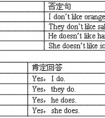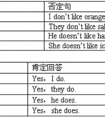Who do you want to ____________?[ ]A. write toB. writeC. writing to-六年级英语
4. near
在------附近 There is a book shop near our school.
5. in front of
在------前面 A boy is standing in front of the house.
6. beside
在------旁边 A football is beside the door.
7. next to
紧挨着 There is a bus station next to No. 13 Middle School.
8. over
在------正上方 A bridge is over the river.
9. on the left
在------左边 The bookstore is on the left.
10. on the right
在------右边 The hospital is on the right.
11. before
在……之前 Mike sits before me.
12. after
在------以后 He went home after school.
13. in the middle
在------中间 The road is in the middle.
14. at
(1) 在------(小地方) I am at school today. I was at home yesterday.
(2) 在------(点钟) I usually go to school at 8:00 am.
(3)看一看 Look at the blackboard.
(4) 在中午 at noon
15. behind
在------后面 There is a broom behind the door.
16.for
(1)给 This present is for you.
(2)为了 Thank you for telling me the way to the zoo.
(3)作为 We have some chips and hamburgers for lunch.
17.to
(1) 到 Take your sport shoes to the P.E class.
(2) 致 Happy birthday to you. Give it to your friend.
18. from
来自 I am from China. = I come from China.
19. from --- to
从------到------ Line up from shorter to taller.
We have class from Monday to Friday.
20. of
------的 He is a student of Kama School.
21. by
(1)在------之前 We must be at home by 6 o’clock.
(2)乘------交通工具 People can go to the moon by spaceship.
I go to school by bus.
22.with
(1) 用 I write a letter with a pen.
(2) 和------一起 He went to Shenzhen with his parents.
23. between
在------与------之间 There is a football match between Class One and Class Three.
24. into
到------里 Sharks can dive into the deep cold water.
25. like
(1)象------ The twins are like their father.
(2)长相------怎样? What’s he like?
26. up
向上 Put up your hands if you have any questions.
27. down
向下 Put down all the books here.
28. about
(1) 大约;关于 It’s about 6:00 now.
(2) ------怎么样? What about---? How about---?
29. what for
为什么 But what for?
早、午、晚要用in,at黎明、午夜、点与分。
年、月、年月、季节、周,阳光、灯、影、衣、冒in。
将来时态in...以后,小处at大处in。
有形with无形by,语言、单位、材料in。
特征、方面与方式,心情成语惯用in。
介词at和to表方向,攻击、位置、恶、善分。
日子、日期、年月日,星期加上早、午、晚,
收音、农场、值日on,关于、基础、靠、著论。
着、罢、出售、偷、公、假,故意、支付、相反,准。
特定时日和"一……就",on后常接动名词。
年、月、日加早、午、晚,of之前on代in。
步行、驴、马、玩笑on,cab,carriage则用in。
at山脚、门口、在当前,速、温、日落、价、核心。
工具、和、同随with,具有、独立、就、原因。
就……来说宾译主,对、有、方状、表细分。
海、陆、空、车、偶、被by,单数、人类know to man。
this、that、tomorrow,yesterday,next、last、one。
接年、月、季、星期、周,介词省略已习惯。
over、under正上下,above、below则不然,
若与数量词连用,混合使用亦无关。
beyond超出、无、不能,against靠着,对与反。
besides,except分内外,among之内along沿。
同类比较except,加for异类记心间。
原状because of,、 owing to、 due to表语形容词
under后接修、建中,of、from物、化分。
before、after表一点, ago、later表一段。
before能接完成时,ago过去极有限。
since以来during间,since时态多变换。
与之相比beside,除了last but one。
复不定for、找、价、原,对、给、段、去、为、作、赞。
快到、对、向towards,工、学、军、城、北、上、南。
but for否定用虚拟,复合介词待后言。
ing型由于鉴,除了除外与包合。
之后、关于、在......方面,有关介词须记全。
in内to外表位置,山、水、国界to在前。
考点名称:动词不定式
- 不定式定义:
由to+动词原形构成。不定式是一种非限定性动词。而非限定动词是指那些在句中不能单独充当谓语的动词,可分为不定式,动名词,现在分词和过去分词。
“动词不定式”由动词+不定式构成。动词不定式在句中可以作句子除谓语之外的任何句子成分。动词不定式的被动形式除了一般形式外还有其完成式和进行式。
常见的有:like / love,want,need,ask,help等。
例:I like to play with Tom. 我喜欢和汤姆玩。
I want to play with Tom. 我想和汤姆玩。
I like to eat dumplings. 我喜欢吃饺子。 - 动词不定式一般结构:
疑问词who,what,which,when,where,whether,how后可接不定式构成不定式短语,在句中作主语、宾语、表 语等。如:
①When to leave for London has not been decided yet. (不定式在句子中做主语)
②Mr. Smith didn't know whether to leave or stay there. (不定式在句子中做宾语)
③I asked Professor Xu how to learn English well. (不定式在句子中做直接宾语)
④The question was where to get the medicine needed. (不定式在句子中表语)
以上例句中疑问词+不定式部分,均可转换为相应的从句形式。如:
①When we shall leave…
③…how I could learn…
经常在这种结构中使用的动词有:
consider,decide,discover,explain,find out,forget,hear,know,lea rn,observe,understand,wonder等。 - 动名词与不定式的区别:
1 动名词与不定式的区别:
动名词表达的是:状态,性质,心境,抽象,经常性,已发生的
不定式表达的是:目的,结果,原因,具体,一次性,将发生的
2 接不定式或动名词,意义相同。
3在下列情况下,一般要用不定式:
①hate,like,love前有would(should)时,
如:I'd like to have a cup of coffee.
②当谓语动词begin,continue,start等是进行式时,
如:Thestudents are starting to work on the di fficult maths problem.
③begin,continue,start与know,understand等状态动词连用时,
如:I soon began to understand what was happening.
④.advise,allow,encourage,forbid,permit等动词后接动名词作宾语,或带不定式作宾语补足语。如:
Our teachers don't permit our/us swimming in the lake.
Our teachers don't permit us to swim in the lake.
4 部分动词后接不定式或动名词时,意义差别较大,应根据句子语境选择使用。
forget,remember,regret后接不定式,表示现在或未来的动作,接动名词表示动作已经发生。如:
Don't forget to post the letter for me.
Have you forgotten meeting her in Beijing Airport?
Remember to close the windows before you leave.
I remember writing him a letter a year ago.
We regret to tell you that all of you are not invited toattend the meeting.
They regretted ordering these books from abroad. - 省to的动词不定式:
(1)情态动词( 除ought 外,ought to意思是“应该”,是情态动词,只有一种形式,后边接动词不定式,to不能省略。
ought to没有人称和数的变化,后接动词原形可以表示现在、将来或过去将来,由时间状语或上下文决定。例如:
They ought to come tomorrow.他们明天应当来):
(2)使役动词 let,have,make:
(3)感官动词see,watch,look at,notice,observe,hear,listen to,smell,feel,find 等后作宾补,省略to。
注意:在被动语态中则to 不能省掉。
在使役动词中get除外(get sb. to do sth.)
I saw him dance.
=He was seen to dance.
The boss made them work the whole night.
=They were made to work the whole night.
(4)表示个人意愿或倾向的would rather,had better,might(just) as well:rather than置于句首时。
Rather than ride on a crowded bus,he always prefers to ride a bike.
(5)Why… / why not…:
(6)help 可带to,也可不带to,help sb (to) do sth:
(7)but和except:but前是动词do时,后面出现的动词用不带to的动词不定式。
(8)由and,or和than连接的两个不定式,第二个to 可以省去:
(9)通常在discover,imagine,suppose,think,understand等词后,可以省去to be:
- 最新内容
- 相关内容
- 网友推荐
- 图文推荐
上一篇:I am going to___________in the small town ___________two weeks. [ ]A. live, forB. live, toC. living, for-六年级英语
下一篇:What's this _____________English? [ ]A. inB. onC. atD. of-六年级英语
零零教育社区:论坛热帖子
| [家长教育] 孩子为什么会和父母感情疏离? (2019-07-14) |
| [教师分享] 给远方姐姐的一封信 (2018-11-07) |
| [教师分享] 伸缩门 (2018-11-07) |
| [教师分享] 回家乡 (2018-11-07) |
| [教师分享] 是风味也是人间 (2018-11-07) |
| [教师分享] 一句格言的启示 (2018-11-07) |
| [教师分享] 无规矩不成方圆 (2018-11-07) |
| [教师分享] 第十届全国教育名家论坛有感(二) (2018-11-07) |
| [教师分享] 贪玩的小狗 (2018-11-07) |
| [教师分享] 未命名文章 (2018-11-07) |


![Where is my bag? It's _____________the desk. [ ]A. inB. behindC. on-五年级英语](http://www.00-edu.com/d/file/ks/4/1/44/2019-08-20/small3591750882d019139d20d416cb80f64f1566236486.jpg)
![Where's my pen? [ ]A. It's in the desk.B. It's under the desk.C. It's on the desk.-四年级英语](http://www.00-edu.com/d/file/ks/4/1/44/2019-08-20/small4157828d9d6bc1a02bdbdd4d3ffccde61566236790.jpg)

![I can call you _____________ the phone.[ ]A. inB. atC. onD. of-六年级英语](http://www.00-edu.com/d/file/ks/4/1/44/2019-08-20/small17adfe158040ebb20380cac1c81e7ec81566232881.jpg)
